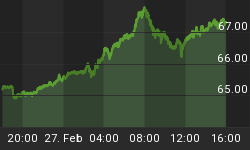Now that the bank stress tests, the unemployment report and the Treasury auctions are out of the way, Forex traders are likely to return their focus to U.S. interest rates this week.
Yields have been rising lately driving June Treasury Bonds and June Treasury Notes lower. This has also helped push mortgage rates back over 5%. The Fed is concerned about the higher mortgage rates so it is preparing to buy back several billions of dollars of mortgages this week.
I think that mortgage rates are higher than the Fed is comfortable with so it may begin to get aggressive with its government asset buyback program. If mortgage rates get too high then the housing recovery could stop in its track and erase some of the gains beginning to show in this economy.
The rise in yields has made treasuries an attractive investment. With the rise in treasuries and the weakness in equities, it was clear throughout the day that some investors had become averse to risk. As traders became more defensive throughout the day, they took profits in stock and turned around and bought the guaranteed Treasuries. The U.S. Dollar rose as traders had to buy the greenback to invest in Treasuries. This repatriation by U.S. investors gave the Dollar a boost all day.
One of the main concerns this week for Euro traders will be the Euro Zone production report. This report is expected to show a contraction indicating the recession is even worse than previous estimates. This news alone could be enough to get the European Central Bank to commit to a more aggressive plan to stimulate the economy.
The GBP USD was under pressure today because of the stronger Dollar. The main concern for investors at this time is the stepped up quantitative easing by the Bank of England. Its aggressive activity is sending a signal that the economy may be worsening. Besides falling housing and rising unemployment, British Pound investors have to be concerned about the widening U.K. budget deficit and contracting economy.
The combination of a strong Dollar and falling commodity prices could have an adverse effect on commodity-based currencies such as the Canadian Dollar, Australian Dollar and the New Zealand Dollar over the short-run.
Falling equity prices and weakening crude oil may have the biggest effect on the Canadian Dollar. Lately the Canadian Dollar has been working lock-step with the U.S. market. Overbought technical signals are leading traders to believe that a break in the equity markets is inevitable. This break should start a corrective short-covering rally in the USD CAD.
Falling crude oil could be indicating that traders believe the rate of recovery of the U.S. economy may be slower than anticipated. With the world awash in crude oil, look for long speculators to take profits. This action will push crude oil prices lower. Falling crude oil prices will not be good for the Canadian economy.
The U.S. Dollar looks like it is going to be a winner this week. Forex traders will be too distracted by European production reports this week to try to defend their currencies. Furthermore, investors are going to move money into the U.S. Treasuries to take advantage of the higher yields. In the meantime, be prepared to buy the Dollar on breaks as a flight-to-guaranteed Treasuries will lead to an appreciation in the Dollar.















